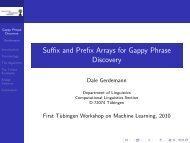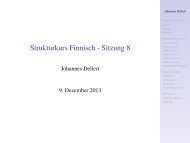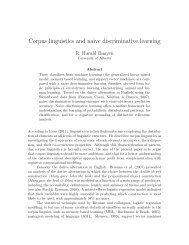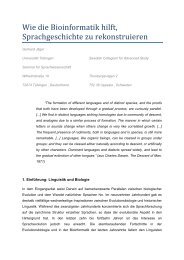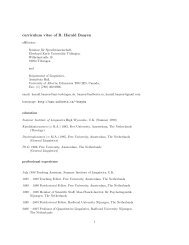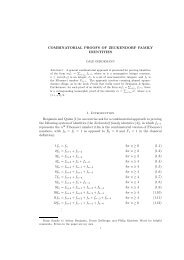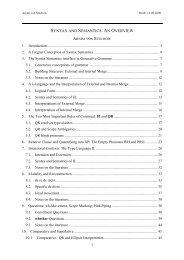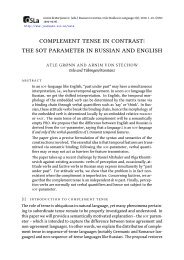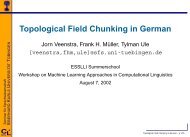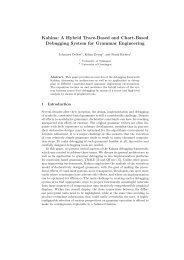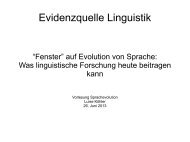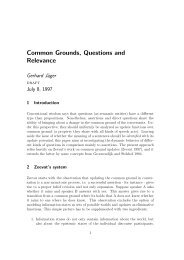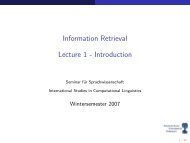A Treebank-based Investigation of IPP-triggering Verbs in Dutch
A Treebank-based Investigation of IPP-triggering Verbs in Dutch
A Treebank-based Investigation of IPP-triggering Verbs in Dutch
Create successful ePaper yourself
Turn your PDF publications into a flip-book with our unique Google optimized e-Paper software.
Some verbs occur twice, s<strong>in</strong>ce they have different mean<strong>in</strong>gs. For example, the verb<br />
leren is a rais<strong>in</strong>g verb if it has the mean<strong>in</strong>g ‘teach’ (5a), but it is a control verb if it<br />
denotes the mean<strong>in</strong>g ‘learn’ (5b).<br />
(5) a. ’k heb mijn kle<strong>in</strong>e k<strong>in</strong>deren daar ook leren zwemmen .<br />
I have my small children there also teach-INF swim<br />
‘I have also taught my little children how to swim over there’ (fva400659__44)<br />
b. In 2001 heb ik sax<strong>of</strong>oon leren spelen .<br />
<strong>in</strong> 2001 have I saxophone learn-INF play<br />
‘In 2001 I learned to play the saxophone.’ (dpc-qty-000936-nl-sen.p.36.s.2)<br />
The results <strong>of</strong> the treebank m<strong>in</strong><strong>in</strong>g reveal that the rais<strong>in</strong>g verbs (that allow perfective<br />
constructions), allow <strong>IPP</strong>. The modal, evidential, causative, and perception<br />
verbs all obligatorily trigger <strong>IPP</strong>. Rais<strong>in</strong>g verbs that optionally trigger <strong>IPP</strong> are the<br />
benefactive object raisers leren ‘teach’ and helpen ‘help’, and the aspectual subject<br />
raisers beg<strong>in</strong>nen and ophouden ‘stop’.<br />
The most heterogenous group consists <strong>of</strong> subject control verbs, as that category<br />
conta<strong>in</strong>s verbs that obligatorily trigger <strong>IPP</strong> (e.g. aspectual motion and position<br />
verbs such as lopen ‘walk’ and staan ‘stand’, cf. (6)), verbs that do not allow<br />
<strong>IPP</strong> (e.g. besluiten ‘decide’, cf. (1)), and verbs which occur <strong>in</strong> both <strong>IPP</strong> and PSP<br />
constructions (e.g. proberen ‘try’, cf. (3a-3b)).<br />
(6) Met wat meer geluk hadden we hier staan juichen.<br />
With some more luck had we here stand-INF cheer<br />
‘With a bit more luck we would have been cheer<strong>in</strong>g.’ (WR-P-P-H-0000000020.-<br />
p.14.s.8)<br />
Due to data sparseness, not all <strong>IPP</strong>-triggers occur <strong>in</strong> the treebanks. In order to<br />
get a more complete list, we have also <strong>in</strong>cluded verbs which occur as <strong>IPP</strong>-trigger<br />
on the Internet us<strong>in</strong>g Google search. 6 An example is the aspectual subject raiser<br />
ophouden ‘stop’, cf. (7). The frequency <strong>in</strong>formation <strong>of</strong> those Google results is not<br />
<strong>in</strong>cluded <strong>in</strong> Table 2.<br />
(7) Een reisorganisatie die helaas heeft ophouden te bestaan.<br />
A travel organisation that unfortunately has stop-INF to exist<br />
‘A travel company that unfortunately has ceased to exist.’ (Google, 30-10-2012)<br />
In order to overcome the problem <strong>of</strong> data sparseness, future research will focus<br />
on collect<strong>in</strong>g <strong>IPP</strong>-triggers <strong>in</strong> larger treebanks (e.g. LASSY Large, which currently<br />
conta<strong>in</strong>s 2.4 billion tokens). If more data are found, we will also be able to <strong>in</strong>vestigate<br />
<strong>in</strong> which situation the PSP construction is preferred over an <strong>IPP</strong> construction.<br />
6 www.google.be/www.google.nl<br />
11



